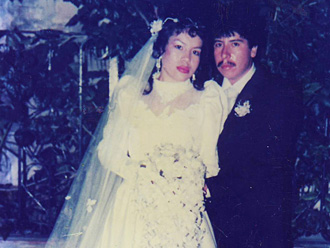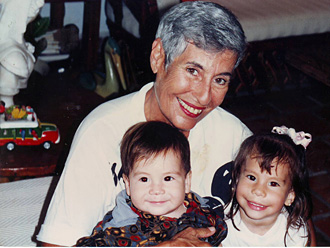
|
 |
 |
 Vallarta Living | April 2008 Vallarta Living | April 2008  
Living in Mexico is Better With Spanish
 Polly G. Vicars - PVNN Polly G. Vicars - PVNN


| | Martha Flores Salcedo and Melchor Cortes Cortes at their 1989 wedding | 
| | Little Alex and Yesi, part of our beautiful extended family | | |
Recently I read an article in a local English language newspaper entitled "Living in Mexico Without Spanish" and was moved to "tell you the rest of the story." The author correctly said that "the majority of the retirees that live in PV have little Spanish speaking ability and get along just fine." Well that depends on your definition of "getting along just fine."

One of my great pleasures is in sharing a really funny joke or incident with Mexican friends in their language, albeit with a pronounced Southern Drawl. Incidentally I know what the bus driver or the waiter is saying to or about me and thus can avoid misunderstandings (usually).

I don't need an intermediary to help me at Immigration, the Internet office, the lawyer's office or the laundry down the street. When Husband and I are lucky enough to be invited to dinner or to a fiesta given by an English speaking Mexican friend, we can enjoy conversations with the other guests who are usually not bi-lingual.

The author also said "virtually all educated Mexicans in PV... are fluent in English" - implying that "educated" equals fluency in English. It is certainly true that many professional women and men do speak English, and some fluently.

However, many only speak and understand the language of their profession and choose to use Spanish for other conversation, which sometimes stretches my ability and understanding, but somehow I manage to hold my own.

While not trying to put down the well-meaning author, I just want to let ex-pat visitors and residents know how much they are missing by not at least trying to learn this beautiful and expressive language. It is not easy to learn Spanish. Quite the contrary! Both Husband and I have struggled, struggled and struggled. But like my candidate for the Democratic nomination for President of the US, Hillary Clinton, we keep on keeping on, always improving our use of the language.

Back in 1988 when we moved lock, stock and Spanish dictionary from Kentucky to Puerto Vallarta, one of the first things we did was sign up for Spanish classes. Here is what I wrote about our teacher, Maestro Melchor Cortes Cortes in my first book:

Husband and I sat down in a tiny classroom across the table from a handsome twenty-five-year-old man. Of slight stature, he had the mandatory black mustache, black hair and eyes, fair skin, and a welcoming smile that lit up the room. He began our private instruction with patience and understanding.

He empathized with our situation, as he had recently learned his near-perfect English in this very classroom. As the one hour, thrice weekly lessons progressed, we began to learn a little Spanish and a lot about this young man. He soon joined a special group of young people (ex-students, children of friends) from different times and different places who make up our extended family.

He was born in Michoacán, a state that is famous for its colonial city of Morelia, exquisite crafts, natural beauty (stretching from the Pacific to the central Sierra Madres,) and its warm hearted people. With times bad in his home state, he and his father journeyed to Puerto Vallarta to find work. His beautiful mother and his six brothers soon followed, leaving two married sisters and their families remaining in Michoacán.

Daily, as Melchor walked back and forth from the construction job he found in Vallarta, he passed a sign in a window that translated to "Learn English Here." Desire to learn this language stirred deep within him, and one day he screwed up his courage, went in, signed up, and his life was changed forever.

His gringa teacher said she knew he was "special" from the first class. Soon he was way ahead of the others. She offered him a job teaching Spanish to gringos while he continued with his own lessons. Later he became so skilled in our language, he also taught English to Mexicans.

He was single, but had a novia (fiancé.) The wedding was on hold until he could save enough money to pay for everything. In México, the groom pays for the whole wedding - including the bride's dress. He needed money to hire a large hall, engage a band, prepare a dinner for two to three hundred guests, and lay in beer and spirits for them all.

At last, Melchor, with almost all of the cash in hand, set the date. The whole family leaped into action. Papá raised and fattened a calf to serve for the reception's main course. Mamá journeyed to the nearest big city in a search of pearls and lace and just the right satin for the wedding dress she was designing and sewing. The rest of the family wrote invitations, crafted favors for each guest, and tied satin ribbons to lacy packages of rice.

Finally everything was ready for the big day. Vallarta's uniquely crowned cathedral was decorated with fragrant flowers, the bridesmaids were gowned and giggly, and Martha, the bride, was resplendent in her elegant gown that would have been a show stopper on any Paris runway. Here, there is seldom the customary "hush" heard in similar situations in the States.

Here, the children romp, the elders confer, and no one worries if things are not quite as might be expected. For instance, Melchor had bought the shiny gold circle that would symbolize his eternal promise to Martha and carefully laid it away. He never thought of it again until he was in the cathedral where he realized he did not have it with him. Commandeering his brother, they splurged on a taxi and raced to his home to get the ring.

Ay! Caramba! He had forgotten the key to the house. He hoisted his brother on his suited shoulders and pushed him through an open second floor window. Ring retrieved, the waiting taxi rushed them back to the cathedral where the romping and the conferring was beginning to make us gringos wonder what the heck was going on.

But still more waiting! It seemed that Papá, whose calf was simmering in the pot, ready to provide all of us with a delicious meal, had begun the day with a little celebrating - and then a lot of celebrating. Mamá was having a hard time getting him to the church on time! Finally, everyone was in place and those two handsome, wholesome young people were married and married and married - and then married a little more in the mandatory civil ceremony that followed the religious one. Ain't no way those vows could be broken!

The reception, a full course dinner with bottles of brandy on every table, a live band, and hundreds of family and friends with whom to celebrate, was everything a bride and groom could ask. Guests waited patiently to dance with the bride or groom in order to pin to the wedding dress or wedding suit their monetary contribution. By the end of the dance, both bride and groom were completely covered with bills and the price of the band was secured. The bride was paraded around on hoisted chair, and the same treatment was afforded the aproned groom - long held customs hailed boisterously by the guests. Need I say, "A good time was had by all?"

Our Spanish progressed, and our love and respect for this young couple grew. They worked hard and played hard. We dined on spicy chiles rellenos prepared and served elegantly in their one room apartment. With them, we hiked up the mountain to attend rodeos where cowboys displayed incredible roping and riding skills, swam in the Pacific, played beach volley ball, and dominoes (and consistently lost.) We learned anew what is and what isn't important in life.

Now, almost sixteen years since the book's publication, I am happy to report that Maestro Melchor is our closest and dearest friend along with his lovely wife, Martha, and their two children, Yesenia, now 16, and Alex, now 14.

Our life has been so enriched by our ability to converse in the language of our adopted culture and we are incredibly grateful to Maestro Melchor for his patience and perseverance in teaching us those durn verbs and a vocabulary that enables us to live so comfortably in what my mother-in-law called that "furin land."

To live in Mexico "With Spanish" give Maestro Melchor a call at his very successful Spanish School, where he is teaching many ex-pats to hablan español correctly. He has the only Spanish language school in Puerto Vallarta that teaches the famous Warren Hardy system.

His air conditioned classroom is attractive and usually filled with laughter and fun as he and Martha do their best to make their students truly bi-lingual. See his web page at SpanishSchoolVallarta.com, or give him a call at (322) 224-8917 or 044-322-228-0822 or email him at info(at)spanishschoolvallarta.com
 Polly G. Vicars and her husband of 55 years, Hubert (a.k.a. "Husband") retired to Puerto Vallarta in 1988 and soon became active members of several charitable organizations. Polly is the author of "Tales of Retirement in Paradise: Life in Puerto Vallarta, Mexico" [a sell-out!] and "More Tales of Retirement in Puerto Vallarta and Around the World." Proceeds from the sale of her books go to the America-Mexico Foundation, a scholarship foundation that is their passion. Polly G. Vicars and her husband of 55 years, Hubert (a.k.a. "Husband") retired to Puerto Vallarta in 1988 and soon became active members of several charitable organizations. Polly is the author of "Tales of Retirement in Paradise: Life in Puerto Vallarta, Mexico" [a sell-out!] and "More Tales of Retirement in Puerto Vallarta and Around the World." Proceeds from the sale of her books go to the America-Mexico Foundation, a scholarship foundation that is their passion.

Click HERE for more articles by Polly Vicars. | 
 | |
 |



